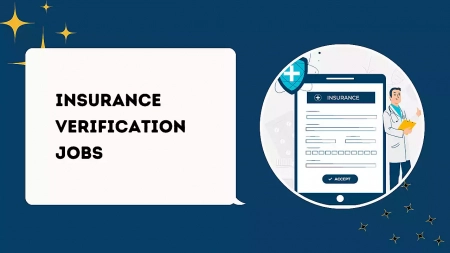Insurance Verification Jobs – How to Apply for Insurance Verification Jobs
Insurance verification jobs are essential to preserving the financial stability and operational effectiveness of healthcare organizations. The process involves confirming the details of coverage and the eligibility of patients’ insurance plans before providing medical services.
READ ALSO: Insurance Broker Salary – How Much Does an Insurance Broker Earn
The process of verifying an individual’s insurance coverage and benefits before a visit is known as insurance verification. It is the process of verifying that a patient’s insurance plan is in your network and covers the services you offer, which is more significant.

If not, you can tell the patient that they will need to pay for your services completely out of pocket or you can refuse to let them see you. It is handled by front-desk employees at certain medical practices.
In this instance, an employee’s workday may consist of an astounding amount of insurance verification.
What is Insurance Verification?
Insurance verification is the procedure for verifying a patient’s health insurance status twice. Insurance verification specialists are the professionals in charge of this.
Making sure a patient’s insurance will pay for necessary medical procedures or hospital stays is their main duty. In addition, they perform claims examinations, bill, and verify patient information. It may also be expected of specialists to inform patients about their coverage.
How Much Do Insurance Verification Specialists Earn?
In the US, an insurance verification specialist makes, on average, $33,043. Salary ranges are normally between $28,000 and $37,000 per year. They make, on average, $15.89 per hour. The location, level of education, and amount of experience all affect their pay. They earn the highest average pay in New Hampshire.
What are the Roles and Responsibilities of Insurance Verification Jobs?
Their tasks include:
- Verifying insurance information for new patients and referrals.
- Updating current patients’ insurance information.
- Calling to get pre-approval for suggested treatments and operations.
- Explaining to patients what their financial obligations are.
- Notifying the appropriate clinical staff about denials.
It also includes responding to inquiries about insurance and billing.
CHECKOUT: Insurance Broker vs Agent – Apply for Insurance Broker and Agent Jobs
Insurance Verification Job Requirements and Qualifications
The requirements and qualifications include:
- High school diploma or GED certificate
- Associate degree (or equivalent experience)
- Medical billing experience (2 years preferred)
- Knowledge of CPT codes and basic medical terminology (preferred)
- Phone communication skills
Bilingual ability (English/Spanish) is a plus.
Pros of Insurance Verification Jobs
This position comes with several potential advantages:
- Stability: People always need insurance, even in times of economic uncertainty, so the insurance market is generally steady. Job security may result from this stability.
- Variety of settings: They have the opportunity to work in a variety of environments, including insurance companies, medical offices, hospitals, and third-party billing companies.
- Entry-level opportunities: Many of these jobs are entry-level, meaning that a high school diploma or its equivalent is all that is needed in terms of education or experience. Because of this, it may be a viable career option for recent graduates.
They also frequently deal with patients, medical professionals, and insurance company representatives, which can foster the development of strong communication and interpersonal skills.
Cons of Insurance Verification Jobs
Some of the cons include:
- Stress and workload: Because of the amount of work and the close deadlines, it can be stressful.
- Repetitive tasks: The work frequently entails repetitive duties, like calling insurance companies or going over the specifics of policies. It can be mentally taxing to be so monotonous.
- Limited advancement opportunities: Some professionals discover that there isn’t much opportunity for advancement in this field. There might not be many chances for advancement, which would cause job stagnation.
- Communication challenges: It can be difficult to coordinate with various departments, insurance companies, and patients. Furthermore, ineffective communication can irritate patients and cause delays in procedures.
Additionally, some employers place more emphasis on quantity than quality, concentrating only on achieving productivity targets, which may jeopardize the accuracy of the process.
How to Apply for Insurance Verification Jobs
Here are the steps you can follow to apply for this position:
- Go to indeed.com
- Enter “Insurance verification jobs,” on the webpage and make sure to select the US location.
- Once you press the search button, the screen will show the results.
- From the list of search results, select the job that best meets your needs and click on it.
Then click “Apply now” and follow the on-screen instructions.
Frequently Asked Questions
Below are frequently asked questions.
Why is Insurance Verification so Important for Providers?
One of the most important aspects of healthcare revenue cycle management is insurance verification. It guarantees that healthcare providers receive fair compensation for their services, minimizes administrative burdens, enhances patient satisfaction, and maintains financial transparency.
How do you call Someone who does Insurance Verification?
Typically, people refer to them as insurance verification specialists.
How Do I Know If I’m Being Paid Fairly as an Insurance Verification Specialist?
If your pay is close to the state average, you can determine if you are receiving a fair wage. For instance, you ought to make about $42,398 a year if you reside in Alaska.
What State Pays Insurance Verification Job the Most?
Insurance verification specialists are paid the highest wages in the US in New Hampshire, where the average pay is $20.54 per hour or $42,720 annually.
Conclusion
Insurance verification jobs are essential to maintaining efficiency and accuracy in the insurance sector. Strong communication abilities, painstaking attention to detail, and a comprehensive grasp of insurance policies and procedures are necessary for these roles.
